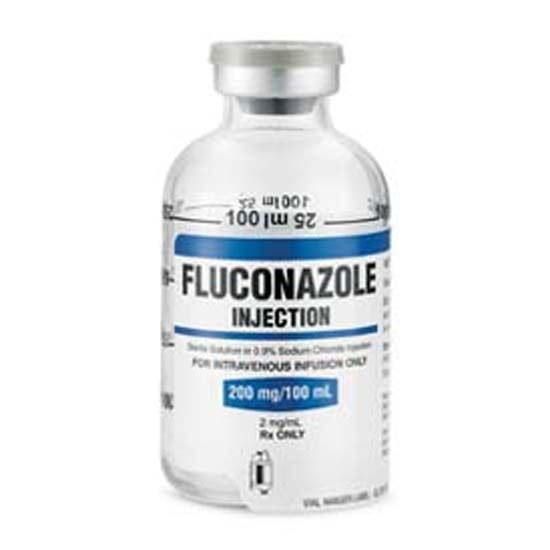
Fluconazole – Injection, Diflucan
Medication Uses How To Use Side Effects Precautions Drug Interactions Overdose Notes Missed Dose Storage USES: Fluconazole is an azole antifungal used to prevent and treat fungal infections. It works by stopping the growth of fungus. HOW TO USE: This medication is given by injection into a vein as directed by your doctor, usually once daily. Dosage is based on your medical condition and response to treatment. For children, the dosage is based on weight.If you are giving this medication to yourself at home, learn all preparation and usage instructions from your health care professional. Before using, visually check this product for particles or discoloration. If either is present, do not use the liquid. Learn how to store and discard medical supplies safely. This medication works best when the amount of medicine in your body is kept constant. Therefore, use this drug at evenly spaced intervals.Continue to take this medication until the full prescribed amount is completed, even if symptoms disappear. Stopping the medication too early may result in a return of the infection. Inform your doctor if your condition persists or worsens. SIDE EFFECTS: Nausea, vomiting, diarrhea, stomach/abdominal pain, hair loss, or headache may occur. If these effects persist or worsen, inform your doctor promptly. Remember that your doctor has prescribed this medication because he or she has judged that the benefit to you is greater than the risk of side effects. Many people using this medication do not have serious side effects. Inform your doctor right away if you experience any serious side effects, including: easy bruising/bleeding, new signs of infection (e.g., persistent sore throat, fever). Get medical help right away if any of these rare but very serious side effects occur: severe dizziness, fainting, fast/irregular heartbeat, seizures. This drug may rarely cause serious (possibly fatal) liver disease. If you notice any of these highly unlikely but very serious side effects, seek immediate medical attention: severe stomach/abdominal pain, persistent nausea/vomiting, yellowing eyes/skin, dark urine, unusual tiredness. A very serious allergic reaction to this drug is rare. However, seek immediate medical attention if you experience any symptoms of a serious allergic reaction, including: rash, itching/swelling (especially of the face/tongue/throat), severe dizziness, trouble breathing. This is not a complete list of possible side effects. If you experience other effects not listed above, contact your doctor or pharmacist. In the US -Call your doctor for medical advice about side effects. You may report side effects to FDA at 1-800-FDA-1088.In Canada – Call your doctor for medical advice about side effects. You may report side effects to Health Canada at 1-866-234-2345.
PRECAUTIONS: Before using fluconazole, tell your doctor or pharmacist if you are allergic to it; or to other azole antifungal drugs (e.g., itraconazole); or if you have any other allergies. This product may contain inactive ingredients, which can cause allergic reactions or other problems. Talk to your pharmacist for more details.Before using this medication, tell your doctor or pharmacist your medical history, especially of: liver disease, kidney disease. Fluconazole may cause a condition that affects the heart rhythm (QT prolongation). QT prolongation can infrequently result in serious (rarely fatal) fast/irregular heartbeat and other symptoms (such as severe dizziness, fainting) that need medical attention right away. The risk of QT prolongation may be increased if you have certain medical conditions or are taking other drugs that may cause QT prolongation. Before using fluconazole, tell your doctor or pharmacist of all the drugs you take and if you have any of the following conditions: certain heart problems (heart failure, slow heartbeat, QT prolongation in the EKG), family history of certain heart problems (QT prolongation in the EKG, sudden cardiac death). Low levels of potassium or magnesium in the blood may also increase your risk of QT prolongation. This risk may increase if you use certain drugs (such as diuretics/"water pills") or if you have conditions such as severe sweating, diarrhea, or vomiting. Talk to your doctor about using fluconazole safely. Older adults may be more sensitive to the side effects of this drug, especially QT prolongation (see above).During pregnancy, this medication should be used only when clearly needed. It may harm an unborn baby if used in high doses daily during the first 3 months of pregnancy. Discuss the risks and benefits with your doctor.This drug passes into breast milk. Consult your doctor before breastfeeding. DRUG INTERACTIONS: Drug interactions may change how your medications work or increase your risk for serious side effects. This document does not contain all possible drug interactions. Keep a list of all the products you use (including prescription/nonprescription drugs and herbal products) and share it with your doctor and pharmacist. Do not start, stop, or change the dosage of any medicines without your doctor’s approval.Some products that may interact with this drug include: cisapride, rifamycins (e.g., rifabutin, rifampin), warfarin.Many other drugs besides fluconazole may affect the heart rhythm (QT prolongation), including amiodarone, dofetilide, pimozide, quinidine, sotalol, procainamide, macrolide antibiotics (such as erythromycin), among others. Therefore, before using fluconazole, report all medications you are currently using to your doctor or pharmacist.Fluconazole can slow down the removal of other medications from your body, thereby affecting how they work. These affected drugs include amitriptyline, certain drugs that affect the immune system (e.g., cyclosporine, tacrolimus, sirolimus), certain calcium channel blockers (e.g., felodipine, nifedipine, nisoldipine), eplerenone, certain "statin" cholesterol medications (atorvastatin, fluvastatin, lovastatin, simvastatin), celecoxib, certain benzodiazepines (e.g., alprazolam, midazolam, triazolam), certain anti-seizure drugs (carbamazepine, phenytoin), zidovudine. This is not a complete list.
QUESTION
OVERDOSE: If overdose is suspected, contact a poison control center or emergency room immediately. US residents can call their local poison control center at 1-800-222-1222. Canada residents can call a provincial poison control center. Symptoms of overdose may include: hallucinations, mental/mood changes. NOTES: Laboratory and/or medical tests (e.g., liver function tests) should be performed periodically to monitor your progress or check for side effects. Consult your doctor for more details. MISSED DOSE: For the best possible benefit, it is important to receive each scheduled dose of this medication as directed. If you miss a dose, contact your doctor or pharmacist immediately to establish a new dosing schedule. Do not double the dose to catch up. STORAGE: Consult the product instructions and your pharmacist for storage details. Keep all medications away from children and pets.Do not flush medications down the toilet or pour them into a drain unless instructed to do so. Properly discard this product when it is expired or no longer needed. Consult your pharmacist or local waste disposal company. Information last revised March 2013. Copyright(c) 2013 First Databank, Inc.
Report Problems to the Food and Drug Administration
You are encouraged to report negative side effects of prescription drugs to the FDA. Visit the FDA MedWatch website or call 1-800-FDA-1088.
Selected from data included with permission and copyrighted by First Databank, Inc. This material has been downloaded from a licensed data provider and is not for distribution, except as may be authorized by the applicable terms of use.
CONDITIONS OF USE: The information in this database is intended to supplement, not substitute for, the expertise and judgment of healthcare professionals. The information is not intended to cover all possible uses, directions, precautions, drug interactions or adverse effects, nor should it be construed to indicate that use of a particular drug is safe, appropriate or effective for you or anyone else. Consult a healthcare professional before taking any drug, changing any diet, or commencing or discontinuing any course of treatment.
CONDITIONS OF USE: The information in this database is intended to supplement, not substitute for, the expertise and judgment of healthcare professionals. The information is not intended to cover all possible uses, directions, precautions, drug interactions or adverse effects, nor should it be construed to indicate that use of a particular drug is safe, appropriate or effective for you or anyone else. Consult a healthcare professional before taking any drug, changing any diet, or commencing or discontinuing any course of treatment.


